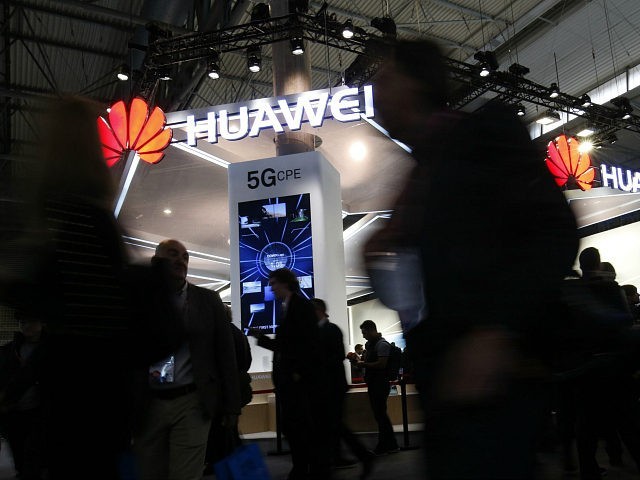Chinese telecom company Huawei rolled out a major program to build self-driving cars on Sunday, seeking a leadership position as a supplier for the AI-driven market even as international distrust for its telecom and Internet services weakens the massive corporation’s existing business model.
The Shanghai Auto Show on Monday saw the debut of the first vehicle using Huawei’s software and hardware, an electric car called the Arcfox Alpha S. The vehicle runs on HarmonyOS, the operating system Huawei originally developed as a replacement for the Android smartphone system.
The car reportedly integrates very smoothly with Huawei’s HarmonyOS smartphones, enabling drivers to control both phone apps and vehicle systems using voice commands or gestures. It will ship later this year with self-driving mode enabled for a few large Chinese cities, including Beijing, Shanghai, and Shenzhen.
The South China Morning Post (SCMP) reported Huawei aims to become a supplier of “intelligent car” components rather than a competitive automaker in its own right. The company plans to invest a billion dollars a year in the intelligent car unit, and has 2,000 employees focused on research and development for self-driving vehicle technologies.
“Electrification and digitalization are viewed as key to the future of cars. Conventional carmakers, electric vehicle (EV) start-ups and technology giants alike are ploughing money and human resources into the development of next-generation cars that will feature autonomous driving and sophisticated in-car entertainment system,” the SCMP noted, listing Alibaba, Tencent, Baidu, and Xiaomi as other Chinese tech giants looking to break into the market.
Huawei already has 18 different automakers lined up to purchase its “5G automotive ecosystem.”
China’s state-run Global Times on Monday predicted the revenue from China’s enormous electric vehicle market would help Huawei “offset the impact of the U.S.’ suppression of its mobile business” after it was blacklisted in 2019 and barred from buying U.S.-made computer chips in 2020.
If that does not work out, Huawei is also developing AI technology for pig farmers and coal miners. (The pig tech helps track diseases and monitor the individual weight and diet of hogs, using facial recognition technology to identify them. China has the world’s largest pig farming industry, a voracious appetite for pork products, and an unfortunate history with swine flu.)
Huawei’s forays into artificial intelligence technology included developing a facial recognition system that can track members of oppressed ethnic minorities, such as the Uyghur Muslims of Xinjiang province, as they move through crowds. Huawei has profited handsomely from selling surveillance technology to the oppressive Chinese state, which creates business opportunities for the telecom giant with initiatives such as mandatory GPS tracking devices on all vehicles in parts of Xinjiang.
Huawei claims its autonomous driving system is “much better than Tesla,” although the Global Times admitted worldwide industry analysts generally see Huawei as the “come from behind” competitor.
A Chinese analyst told the Global Times it was unlikely that intelligent car systems could “reverse the downtrend in Huawei’s net profits and revenue that has been caused by the waning of smartphone production and sales, as both the profit margin and market size of vehicles is smaller than that of mobile phones.”
Huawei lost an estimated two percent of worldwide market share in 2020, with a 41-percent decline in sales last quarter pushing it from the top manufacturer of smartphones to sixth place. Huawei blamed U.S. sanctions against the company for much of this decline. Huawei remains the world’s largest manufacturer of wireless equipment, kept in that position by the expanding Chinese market and surging demand for wireless gear during the coronavirus pandemic.
The Chinese are pushing for leadership in AI technology – and demanding a leading role in setting global AI policy – by taking advantage of the lack of privacy rights for their citizens to amass huge databases of personal information, which can be fed into developing AI systems like grain being fed to livestock. With much larger pools of data for their experiments, more extensive collaboration between government and tech companies, and fewer scruples about testing AI systems like autonomous driving on civilian populations, the Chinese believe they can leap ahead of Western nations.
The Chinese government is helping to develop the market for autonomous vehicles, quickly changing regulations and granting special exemptions from existing law to make it easier for Chinese corporations to field-test self-driving technology.
Nikkei Asia argued in February that China’s willingness to bend or suspend regulations for self-driving vehicle road tests could give Chinese companies a significant advantage over Western competitors during the development stage, and possibly a major advantage in adoption when the technology becomes commercialized, because the U.S. currently lacks a nationwide regulatory framework for autonomous driving. Polls also suggest Chinese customers are considerably more likely to regard self-driving tech as completely safe than Americans or Europeans.
“The development of autonomous driving technology in our country has entered a fast lane. The industry has a strong demand for testing cars in a real-time traffic environment,” the Ministry of Industry and Information Technology said to local governments in January.
Another Chinese agency predicted in November that cars with partial self-driving functions could account for half of new auto sales within five years.

COMMENTS
Please let us know if you're having issues with commenting.